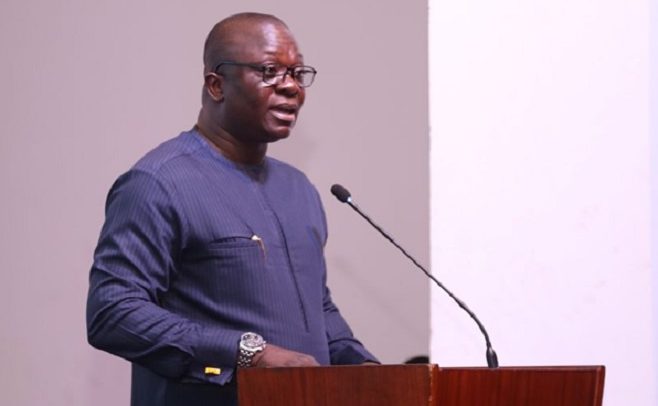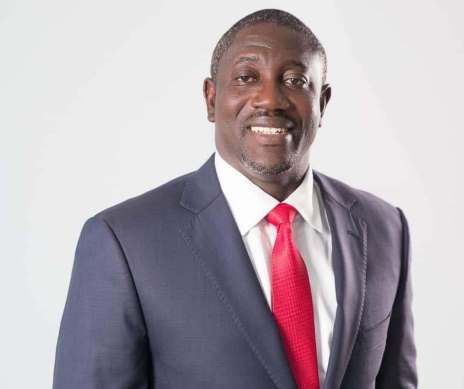
By Joshua Worlasi AMLANU & Ebenezer Chike Adjei NJOKU
The Managing Director of the Ghana Stock Exchange (GSE), Abena Amoah, has underscored the need for a syndicated financing model involving domestic pension funds and foreign capital to unlock long-term financing for infrastructure and commercial projects across the country.
In a sit-down with the B&FT, Ms. Amoah noted that while the domestic capital market is evolving, structural challenges continue to inhibit large-scale financing for development, especially in sectors such as logistics, energy, housing and education.
She proposed a model in which pension funds co-invest with international financial institutions to jointly fund commercially viable projects.
“There is no reason why syndicated funding models involving domestic pension funds and international capital cannot work here. Some modest syndications have already taken place, and the results show that this is a structure we must expand,” she said.
Move from heavy state-financing
The push for syndicated financing comes against the backdrop of limited fiscal space, rising public debt levels and a growing recognition that the government alone cannot finance Ghana’s development needs. Ms. Amoah highlighted that global best practice increasingly relies on blended capital models where public, private and institutional investors pool funds to finance infrastructure and commercial projects.
“No country, not even the most advanced, funds all their development internally,” she said.
“The biggest holders of their government bonds are foreign investors. We should see capital attraction as part of development strategy, not just aid,” she added.
In the local context, this means deliberately creating investment vehicles that can pool local capital—particularly from pension funds—and match it with foreign participation. The GSE’s MD argued that such arrangements not only reduce the burden on government but also build domestic wealth and improve long-term returns for pension contributors.
The local pension fund industry has experienced strong growth. Total assets under management (AUM) under the three-tier pension scheme reached GH¢61.8billion by the end of 2023, representing a 33 percent increase from the previous year.
Private pension funds, which form a significant portion of this, grew by 32 percent to GH¢46.5billion. As of June 2024, total pension fund AUM stood at GH¢78.2billion; and is projected to exceed GH¢100billion by the end of 2025—surpassing earlier 2026 targets.
Despite this expansion, portfolio allocations show a strong preference for low-risk assets, with about 75.4 pecent to 80 percent of pension fund investments concentrated in domestic government securities, including Treasury bonds and Eurobonds.
Other allocations include corporate bonds (18.3 percent), bank securities (5.7 percent), money market instruments like T-bills and cash deposits (35.6 percent), listed equities (5.8 percent) and alternative investments (1.7 percent).
This overconcentration in sovereign debt proved costly during the Domestic Debt Exchange Programme (DDEP), which affected an estimated GH¢31billion of pension fund holdings, reinforcing the cautious posture many trustees now adopt.
“Pension funds are ready,” but they are understandably cautious. They don’t want to threaten contributors’ savings. They need well-structured opportunities with clear governance and risk frameworks,” she explained.
Ms. Amoah advocated for the introduction of minimum thresholds for pension fund allocations into real-sector investments, including infrastructure and equities. Current regulations permit pension funds to allocate as little as zero percent to such assets, a policy she said needs urgent reform.
“If as an industry, we can agree on a minimum – say a fixed percentage over the next five to ten years – that would send a strong signal and unlock significant capital,” she explained.
GSE’s role
The Accra bourse sees itself as an enabler of transparent and efficient capital deployment. Ms. Amoah explained that listing infrastructure-linked financial instruments—such as bonds, funds and special-purpose vehicles (SPVs)—would enhance secondary market liquidity, reduce investment risk and bolster investor confidence.
“If a project vehicle is listed, investors can exit when needed. It also means pricing, financial disclosures and performance data are available for all market participants,” she stated.
As part of this drive, the GSE is collaborating with institutional partners to develop such models. One example is the upcoming listing of a small and medium enterprises (SME) fund backed by FSD Africa. Though targeted at smaller companies, the initiative is seen as a pilot for broader pooled investment vehicles, including infrastructure syndication platforms.
Addressing the infrastructure gap
The need for innovative financing solutions is especially urgent given the sizable infrastructure financing requirements. According to sector estimates, the country requires about US$1.1trillion in infrastructure investments over its economic lifespan—equating to roughly US$37.2billion annually.
In contrast, the 2025 national budget allocated only GH¢13.85billion (approx. US$1.2billion) for infrastructure, primarily targeting roads, hospitals, schools and affordable housing. A significant portion is earmarked for completing stalled projects and expanding major routes like the Accra-Kumasi Highway.
Governance’s missing link
Despite the financial potential, Ms. Amoah acknowledged that governance remains a critical barrier to scaling syndicated models. She pointed to inefficiencies and weak accountability in state-owned enterprises (SOEs) and public-private partnerships (PPPs) as deterrents to institutional capital participation.
“These projects are not inherently unviable. What kills them is often poor governance, not economics. Until we fix that, syndication would not work at scale.”
To tackle these challenges, she advocated for more rigorous project appraisal, independent credit ratings and ongoing performance monitoring—efforts already being supported by domestic agencies Augusto and Beacon Ratings—to enhance transparency and strengthen due diligence in project financing.
“The capital is here. The pensions are here. What we need are structured opportunities that can absorb it at scale,” she further stated.
The post Syndicated financing key to bridging infrastructure gap – GSE MD appeared first on The Business & Financial Times.
Read Full Story
















Facebook
Twitter
Pinterest
Instagram
Google+
YouTube
LinkedIn
RSS